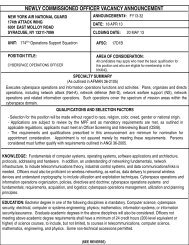1 174th Fighter Wing - Hancock Field Air National Guard Base
1 174th Fighter Wing - Hancock Field Air National Guard Base
1 174th Fighter Wing - Hancock Field Air National Guard Base
Create successful ePaper yourself
Turn your PDF publications into a flip-book with our unique Google optimized e-Paper software.
T<br />
he liturgical calendar for the month<br />
of October is filled with special<br />
saints that share in God's glory and power.<br />
Some of the feast days include <strong>Guard</strong>ian<br />
Angles October 2, St. Francis of Assisi<br />
October 4, and Ss Simon and Jude October<br />
28. These are special days for us to<br />
reflect on God's special helpers to assist<br />
us with our everyday needs and crosses.<br />
The concept of Angles has currently become popular in<br />
the movies and in different literature. We know of Angels form<br />
the different Bible stories. Stories of scripture briefly mention the<br />
archangels Michael and Gabriel and speak of Raphael only in the<br />
old Testament Book of Tobit. Each of these Archangels have special<br />
jobs and they served God without fail. In the New Testament<br />
Gabriel is the messenger who announces the birth of John the<br />
Baptist and the birth of Jesus. Michael appears at the head of the<br />
heavenly hosts, to conqueror Satan in the great battle of the end<br />
time. From the paradise of the Book of Genesis to that of the<br />
Book of Revelation Angels fill the span of sacred history with<br />
their invisible presence and assistance.<br />
Chaplain’s Corner<br />
By Major Douglas Decker, 174 FW, Chaplain<br />
They are the Lord's "angels" or messengers revealing his<br />
designs and carrying out his commands. Above all they sing<br />
God's praises, an immense host of adorers seen by the prophet<br />
Daniel and the apostle John around the throne of the living God.<br />
"Thousands upon thousand were ministering to him, and myriads<br />
upon myriads attended him." (Daniel)<br />
Our Sunday worship joins the angelic worship of heaven.<br />
We offer prayers of praise to God and this joins the heavenly liturgy<br />
of worship, honor and thanksgiving of heaven. Our holy,<br />
holy, holy is echoed in heaven.<br />
God gives each person a helper and guardian. This angel<br />
reference is found in the Book of Psalms. In Psalm 91 we read<br />
that a heavenly spirit is assigned by God to watch over each of us<br />
all the days of our lives. These angles guide and protect us. May<br />
God's Angels guard all of us. May the angels guard our military.<br />
May God's Angels watch over our country and our families. October<br />
2 is the feast of the <strong>Guard</strong>ian Angels.<br />
The Goal of OPSEC<br />
The goal of OPSEC, as a countermeasures"<br />
program, is to deny an adversary<br />
pieces of the intelligence puzzle. There is<br />
nothing new about the principles underlying<br />
OPSEC. In fact, we can trace OPSEC<br />
practices back to the colonial days and the Revolutionary War.<br />
George Washington, our first president, was a known OPSEC<br />
practitioner. General Washington was quoted as saying,<br />
"Even minutiae should have a place in our collection,<br />
for things of a seemingly trifling nature, when<br />
enjoined with others of a more serious cast, may<br />
lead to valuable conclusion."<br />
However, OPSEC, as a methodology, originated during the<br />
Vietnam conflict when a small group of individuals were assigned<br />
the mission of finding out how the enemy was obtaining<br />
advance information on certain combat operations in<br />
Southeast Asia. This team was established by the Commanderin-Chief,<br />
Pacific, and given the code name "PURPLE<br />
DRAGON."<br />
OPSEC Defined/Responsibilities<br />
By Maj Chris McDonald, <strong>174th</strong> FW, OPSEC Officer<br />
It became apparent to the team that although traditional security<br />
and intelligence countermeasures programs existed, reliance<br />
solely upon them was insufficient to deny critical information<br />
to the enemy--especially information and indicators<br />
relating to intentions and capabilities. The group conceived<br />
and developed the methodology of analyzing U.S. operations<br />
from an adversarial viewpoint to find out how the information<br />
was obtained. The team then recommended corrective actions<br />
to local commanders. They were successful in what they did,<br />
and to name what they had done, they coined the term<br />
"operations security."<br />
OPSEC and Government Activities<br />
Over the years it became increasingly apparent that OPSEC<br />
had uses in virtually every government program that needed to<br />
protect information to ensure program effectiveness. OPSEC<br />
professionals modified and improved techniques based on experience<br />
gained with many different organizations and in many<br />
various combat operations.<br />
Today, OPSEC is as equally applicable to an administrative or<br />
research and development activity as it is to a combat operation.<br />
If OPSEC is not integrated into sensitive and classified<br />
activities, chances are that our adversaries will acquire significant<br />
information about our capabilities and limitations. It<br />
probably would have been difficult for the "Purple Dragon"<br />
team to foresee that, 20 years later, the methodology they developed<br />
would become a national program.<br />
4 1-800-883-4484

















